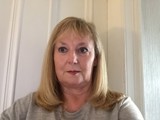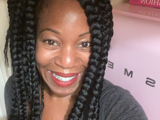In these shared stories you will hear from women about their lived experiences of the menopause, and the various diet and lifestyle changes they’ve made to tried to improve their overall health during and after the menopause and to try to help alleviate their symptoms.
You may hear some of the women talk about some of the complementary therapies that they have tried. However, it is important to note that although complementary therapies, such as herbal or botanical supplements (including red clover, black cohosh, sage and ‘nootrophics’), are available and may claim to help relieve menopausal symptoms, more scientific studies are needed to confirm their safety and effectiveness and the NHS does not recommend their use. For more evidence-based information including the evidence around soya products visit our page on managing menopause symptoms with nutrition and diet.
You will also see the women discussing hormone replacement therapy (HRT). The NHS states that the benefits of HRT are generally believed to outweigh the risks. Benefits and risks will vary from woman to woman, being strongly influenced by your baseline risk, which is affected by diet, lifestyle, past medical and family history. For more information visit the NHS page on hormone replacement therapy.
We’re very grateful to the women who have shared their stories with us. These include:
- Beverley, who is experiencing menopause symptoms and made some changes to her diet
- Afiya, who decided to educate herself more on the role nutrition plays in a healthy lifestyle
- Kim, who has noticed benefits to her energy and anxiety levels after making changes to her diet
- Lorna, who has experienced weight gain and other menopause symptoms
- Sahir, who has made lifestyle changes including around exercise, sleep and stress management
Disclaimer: The views and opinions expressed in these case study (both written and recordings) are solely those of the authors themselves and they do not necessarily reflect those of the British Nutrition Foundation or of the scientific evidence base.
Beverley
Beverley Corper is 54 and works as a manager in their family Retail Business which sells China and Glassware. She is currently perimenopausal and is experiencing menopause symptoms.
I began experiencing symptoms in the last few months after my GP review stopped my prescription for the pill. I tend to get hot flushes and sweats mainly first thing in the morning and at night. I do not seem to get many of these during the day. Having heard stories from those around me, I think I’ve luckily only experienced mild symptoms but think that could also be because of my diet.
The main change I have made to my diet is to only drink calcium-fortified soya milk in my tea, coffee and cereal as I understand soya may be helpful for some women and I think that has helped reduce the intensity of my sweats during the day.
I have not spoken to the doctor as I do not want to go down the route of hormone replacement therapy (HRT). Although from what I understand from friends who do take HRT, it is quite short supply and difficult to get at the moment. The information available online is not very helpful - just pills that are sold in health food shops such as sage pills and other “menopause pills”. I have discussed my symptoms with both my daughters who have an interest in this field as one is a dietitian and one is a nutritionist, and they have also looked into options.

Afiya
Afiya* is 45 years old and lives in London. She is an Artist Manager, Counselling student and Fitness Instructor. She is currently perimenopausal and is experiencing menopause symptoms. [*not her real name]
I began experiencing symptoms a couple of years ago, like brain fog, anxiety, nights sweats and an overall sense of displacement which is hard to articulate. The symptoms were manageable bar the brain fog, which caused me the most concern as it impacted my memory and ability to perform in my job in the way I have previously.
This change in myself felt very discombobulating, and I felt I faced a choice, to go through it or grow through it. I chose the latter.
Slightly concerned about hormone replacement therapy (HRT), I decided to educate myself more deeply on the role nutrition plays in a healthy lifestyle and in specifically mitigating some of the negative effects of menopause and the hormonal changes that occur.
It was this exploration which led me to approach my lifestyle in a more holistic way. From there on in, I overhauled my lifestyle and started exercising most days alongside shifting to a plant-based diet, focusing on whole foods, making legumes a staple source of protein in my diet, increasing my vegetable intake and avoiding consuming too much sugar or processed foods where possible. I also started taking some supplements like vitamin D, and B12, probiotics and turmeric, alongside a variety of other ‘nootropic’ supplements and remedies.
I've seen in my lifetime, menopause get a major rebrand, going from a word barely spoken about even in hushed tones, to becoming a word constantly bandied about, and part of common parlance, with even cosmetic companies appearing to capitalize on this social shift. The change in information available and social acceptance is reassuring to me, as someone who admittedly knew little about the change beyond the fact that one might experience sweats. That said, on the flip side, the abundance of information feels overwhelming at times, and it can be challenging to decipher what is credible information and what is not.
While my approach is rooted in the common knowledge that a good diet and exercise are key for a healthy life, I am game for trying something new, and some of the research emerging around health feels cutting edge and revolutionary. Though I feel some of it is slightly fringe and suspect it might be overhyped and the science not sound, While some of the stuff I read about turning back the clock and reversing aging is exciting, I am unsure of how extensive the studies are or the validity of the evidence.
The changes I’ve made in my lifestyle have brought an undeniable positive impact in my life; I feel and look better than not only two years ago, but ten years ago. Alongside this I’ve also had a positive shift in my attitude and energy all of which has garnered comments from friends and family as to my secret. Fundamentally, the natural approach to the menopause that I have tried to take is working for me - the memory loss I was suffering with is, well, quite literally a distant memory. And so, I don’t feel I am going through the change, more I am evolving!
Kim
Kim Wyatt is a 54-year-old writer who lives in Devon. She is currently perimenopausal and below is her menopause experience – in her words.
My menopause journey began when I was 46 (8 years ago). It started with irregular hot flushes – once or twice a week. However over the years, they’ve now become more frequent and intense.
Also, when I first started experiencing menopause symptoms, around the age of 46, my voice started cracking – like a teenager experiencing puberty! It became quite regular. Fortunately, it was unnoticeable to others, but I could sense it quite clearly. Physically, it felt like having an obstruction in my throat that I often cleared by coughing. Fast forward to 2022, I think my voice has slightly changed pitch but it’s not obvious. The voice cracking stopped after a year and thankfully hasn’t returned.
While I do not experience significant night sweats, I find it extremely difficult to fall asleep at night and when I finally manage to, it’s restless and often full of vivid dreams. Over the past year, I have developed restless leg syndrome – that mainly comes forth at night. Fortunately, since starting hormone replacement therapy (HRT) 6 months ago, my flushes have decreased.

The past year also saw me experience significant hair loss - particularly around my hairline which has obviously receded. My hair is now so thin that sometimes, I can see through my hair to the scalp. I have very fine hair and I have noticed that since perimenopause, my scalp has become much oilier. My eyebrows and eyelashes have thinned too. Personally, hair loss has been one of the most difficult physical symptoms I’ve had to deal with.
Although my hair is thinning, I have grown extra hair on my chin, neck and lower half of my face! This has been a constant symptom since I started perimenopause at 46 years currently shows no signs of abating. On a positive note though, I have become very skilful and adept with tweezers!
Perimenopause has also taken a real toll on my cognitive functioning (just ask my husband and kids!). I am often forgetful and misplace my sunglasses, house keys and mobile on a regular basis. I lose my train of thought during conversations and struggle to find words. Sometimes the brain fog can be debilitating.
Personally, perimenopause has been an emotional rollercoaster. Anxiety and depression have played a huge part of my perimenopausal symptoms.
SEEKING INFORMATION & SUPPORT
I don’t feel that I had extensive knowledge about the menopause. Unfortunately, up until recently, the menopause was never really discussed in society. I only learnt about the menopause from my mother’s experience. She suffered debilitating hot flushes, sleeplessness and anxiety. I saw my mum go through hell. She constantly warned me against the use of HRT. Thankfully times have changed.
However, my circle of close friends who’ve also experienced menopause, have been a fantastic source of information and support for me.
I also believe social media has played a role with public figures such as Davina McCall, Caroline Hirons and Meg Mathews highlighting the lack of support and knowledge about menopause. Dr Louise Newson has a very informative social media account.
On looking I’ve found that there are more product options available for peri/menopausal women from targeted vitamins to facial care. But I couldn’t find much about the role that nutrition plays in menopause. The main dietary information I came across was about the role of soy and tofu (phytoestrogens) in Asian cultures and cuisine. Although I’ve also heard that some reports suggest keto and paleo diets can help in managing menopause symptoms, but all the evidence around it seems to be unsubstantiated and conflicting.
To break this cycle of misinformation, I talk about menopause with my family members. I am teaching my two young sons about it which means they now understand my symptoms much better. I talk to the older women in my family, and I’m shocked by the lack of support they’ve received!
TAKING CONTROL:
Over the past year, I’ve been more motivated to change my diet, especially as diabetes runs in my family. I’ve always had a deep interest in nutrition, and I’ve tweaked my diet to incorporate more plant-based foods in it. I’ve reduced my consumption of meat and as an alternative, introduced tofu and legumes. I try to eat a varied diet incorporating wholegrains, nuts, seeds, fruit, veggies and healthy fats – usually opting for fresh, local produce. I have a sweet tooth (chocolate is my weakness but appreciate it’s not good for my perimenopausal weight gain!) and I’ve tried to reduce my daily intake of sweet treats. I love coffee but to cut my consumption of caffeine, I now have herbal teas. I love cooking and experimenting in the kitchen, and I like to try unique and simple recipes from around the globe. I like punchy, strong flavours and try to use lots of flavourings such as spices and herbs. I feel the combination of changes to my diet have made me feel more energetic, and I’ve noticed I feel less anxious.
Supplements also play a big part of my perimenopausal protocol, and I am particularly fascinated by ‘nootropics’ with the idea that they may boost cognitive performance. On a daily basis, I take a range of supplements from vitamin B to probiotics and vitamin D. Personally, I have felt a positive difference since taking supplements both physically and mentally.
Overall I manage my symptoms by taking HRT, supplements and maintaining a healthy and nutritious diet. Over the past few months, I’ve become more physically active with low impact exercises such as walking and cycling. Having said that, I still balance all this with a good burger and fries! The moderation helps me feel better, mentally and physically. I am also fortunate to have an understanding family and my two sons know exactly when I am having a hot flush!
Lorna
Lorna Ann Sullivan is 67 years old. She is a retired Home Economics teacher and now works one day a week as a Supply teacher.
My menopause story began 16 years ago when I was 51 and my story hasn’t ended, yet. I started experiencing menopause symptoms in the lower half of my body first. I now have very few hairs on my legs, and they don’t tan anymore. I have vaginal dryness which makes intercourse very uncomfortable, and I have very little pubic hair. I have gone up two dress sizes, having put on 3 stone since my early 50’s as I find it difficult to limit my food intake.
I have hot flushes regularly, at night and during the day. They can be very uncomfortable, always in the upper part of my body and very severely on my head, face and neck. I find running my wrists under cold water and putting my arms on a cool gel pad under my pillow help to cool me down a bit. I find very hot weather uncomfortable, and I used to love the sun.
I have very little hair under my arms, which is a positive, but the hair on my head has thinned and is a very different texture, it’s now fine and frizzy, when it used to be very strong and curly. My scalp is extremely dry, and I must have tried every product on the market to moisten it without success.

My gums have become prone to pocketing, so I attend a dental hygienist every 3 to 4 months. Thankfully regular treatment and observation has helped reduce this and has kept my gums healthier.
The other changes I’ve experienced have been an intolerance to loud noises, I’m generally very patient, but loud noises agitate me now. I also get brain fog every now and again, but I’m not sure if that’s a menopause symptom or just another part of ageing.
SEEKING INFORMATION & SUPPORT:
When my periods stopped, I did what most ladies do and read what I could about menopause to see what action I could take to elevate symptoms and make life as good as it could be. 16 years ago there wasn’t enough information about HRT and the information that was available wasn’t very positive, like it is now!
I also visited my doctor to see if there was anything in my medical history that would prevent me from trying some herbal remedies. The doctor was a very young male who I had never met before. He listened to my request and then merely explained what menopause is to me and gave a two page print out to read through. I wasn’t impressed and decided just to let nature take its course and to not take any medication.
However, with recent publicity about HRT being less of a risk and how it elevates some of the experiences I’ve had of the menopause I have considered trying it, but I don’t know who would give me the personal expert advice I would like.
CURRENT SITUATION
My diet has changed substantially. Previously, I had disciplined eating habits and ate correct portions of good well-balanced food. However, now I find it difficult to limit my portions. While I still eat good food it’s still too much of it. I have strong cravings, when my body wants chocolate or cheese, I have to have it, a bit like the few days before I would have had my period or when I was expecting my son.
I think my mental health is good because I keep active, I walk my dogs regularly, I do gentle stretching exercises every day, I work in our garden and do all of the housework. I love sewing, knitting, I make celebration cakes for friends and family, I attend a glass making class, I read, keep in regular contact with friends and I do crosswords and other puzzles every day. I don’t take part in excessive exercising, but I do keep moving and I take vitamin C and D supplements every day.
Sahir
Sahir Ahmed-Evans is 46 years old. She is a personal trainer and Pilates teacher.
I am fiercely passionate about health and wellness for women of all ages, but I am particularly keen on mid-life, women in perimenopause and menopause, having found myself in that life stage.
I am from the South Asian community, and I have found that there is not much discussion or information out there in our community. Our women really don’t open up and don’t have anywhere to turn. It’s still quite a taboo subject.
So I started researching through podcasts, reading, turning to social media, menopause charities and really trying to devour as much information as I could on this topic. Then continuing my own professional development doing some pilates for menopause courses to really just get my teeth into it and learn as much as I could for myself but also for my clients and for other women to be a support and guidance too.

I started to make some lifestyle changes, through nutrition, exercise, sleep, stress management, supplements and have found that this has been beneficial in helping to alleviate and improve some perimenopausal symptoms, but I am still finding that I am struggling with some. One of them being migraines and cognitive issues so I am just about to start on my HRT journey.
One of the ways I am trying to open up dialogue and discussion, and play my part in that, is through my work and through my social media channels, to really get the discussion going and create awareness, dialogue and support for women.

